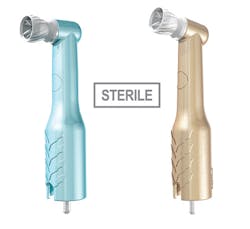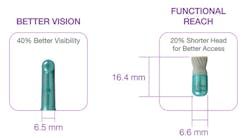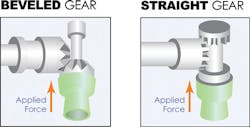Choosing a DPA
Five factors can guide the choice for a disposable prophy angle
By Lory Laughter, RDH, BS, MS
Preventive products have benefited greatly from the myriad of changes in dentistry during the last decade. Greater use of ultrasonic instrumentation, better metal in hand instruments, and improvements in disposable items are just a few changes during my years of practice. From smoother saliva ejectors to softer cotton rolls, the item benefiting most from change is undoubtedly the disposable prophy angle.
When I first began using disposable angles they were made of brittle plastic that often cracked along the seams. In addition, the gears were loud and slow spinning, which produced a "clacking" noise during use. The only benefit of this slower cup was less splatter. It took me some time to adjust to using the disposable models, but having seen the inside of a metal prophy angle made the choice easier for me. The amount of dried up debris inside the metal angle even after autoclaving clinched the final decision.
Disposable prophy angles (DPA) have made vast improvements over the years, and now you can find one to fit your specific needs and desires. The variety of colors, grips, cups, and other features can lead to a long research session when browsing the catalog or trade show floor for your perfect fit. When deciding on a DPA for my use, five factors are the most important-ergonomics, access, smooth running gears, safety, and cost efficiency.
Ergonomics-You may not immediately think about ergonomics when researching DPAs. Yet, it is important to use instruments that fit your hand well and are not so heavy, applying excessive pressure or stress. A DPA should be large enough in diameter at the base to permit holding without needing much fingertip force. Relying on a tight finger grip to maintain control of the DPA puts stress on your fingers and more importantly, your palm, which can lead to carpal tunnel syndrome issues. Some angles come with padded grips to help with grip while others employ knurling around the base to decrease slipping.
Another feature to improve ergonomics is a contra-angle. By angling the working end of the DPA, it is easier to maintain contact with the tooth structure while applying less pressure with your hand or fingers. I find a contra-angle more comfortable to use than a straight angle, and it is a must-have in my setup. In my experience, the slight offset makes all the difference in polishing efficiency.
Access-Access could be included with ergonomics, but the importance of vision during polishing deserves a separate category. DPAs that are bulky make it difficult to actually see the area or surface you are polishing. When gears were larger and internal pieces took more space, the working end of prophy angles were quite wide. Now with smaller mechanisms and advancements in function, it is possible to make DPAs that are narrower, greatly enhancing vision.
The Sterile Mini 90 by Pac-Dent boasts the smallest profile on the market, providing for 40% better visibility and access. Getting to the distal of #2 just became a lot easier.
Gears-One of the most common complaints about a dental visit is the noise. Whether it is the fingernails-on-a-chalkboard sound of scaling or the whirring of the drill, patients do not like the sounds commonly associated with the dental setting. Comedic skits poking fun at these uniquely dental experiences are abundant online. While the skits make us laugh, the comedians are also pointing out the unpleasant aspects associated with oral care.
DPA gears are normally plastic, as well as a tongue-and-groove pattern. Most commonly, this pattern includes two grooved wheels sitting perpendicular to each other. The original plastic gears were prone to slipping, resulting in a loud "clacking" sound. I have also experienced DPAs with gears that simply wear down before polishing is completed, resulting in a noise similar to tires spinning on pavement.
Advancements in design have decreased sound and made for a more powerful cup rotation. Pac-Dent 's Sterile Mini 90 and Sterile Mini Ergo are engineered with a unique beveled gear design providing exceptional durability.
Safety-Infection control is essential in health-care settings. It is so engrained in our every day practice that dental professionals tend to notice a lack of sterility in common settings. How many of us cringe at salad bars and the many uncovered hands touching the shared ingredients? I haven't touched a bathroom door handle in years without a tissue barrier between the knob and my hand. This reality begs to question why we use disposable items that don't meet the standard of cleaniness that we set for ourselves.
Studies have shown that unsterile disposable burs are capable of bacterial growth before being introduced to the oral cavity. It has also been shown the pre-sterilization of the burs can help maintain infection control. Similar studies have been conducted on DPAs. One study investigated the presence of microbial contaminants on unsterilized, prepackaged prophy angles as compared to presterilized prophy angles. As seen in the photos of prophy angles from different brands, there was obvious microbial growth in three brands while no microbial growth is noted in the Pac-Dent Sterile Mini 90. The data showed that, compared to normal DPAs, sterile prophy angles can dramatically reduce the possibility of microbial contamination.
Costs-I've witnessed dental practices trying to save costs by placing disposable items in cold sterile and reusing them. This is not only against CDC guidelines and many state practice acts, it doesn't truly save any money. The cost of purchasing and then properly disposing of cold sterile solutions is greater than properly using disposable items.
DPAs are cost effective when compared to replacing prophy cups on metal angles. Metal angles also wear down over time and can require costly repairs-a cost not associated with DPAs. Sterile Mini 90 and Mini Ergo angles are the slimmest on the market, decreasing waste and adding to cost efficiency.
Considering the cost, safety, smooth sound, and feel along with tooth access and ergonomic advances, DPAs become the clear choice over metal angles with removable rubber cups. Add to those factors the availability of a pre-sterilized DPA to enhance infection control, Pac-Dent has raised the bar with the Sterile Mini 90 and Sterile Mini Ergo angles. Your patients' well-being and your musculoskeletal health deserve no less than the best. RDH
Lory Laughter, RDH, BS, MS, practices clinically in Napa, Calif. She is owner of Dental IQ, a business responsible for the Annual Napa Dental Experience. Lory combines her love for travel with speaking nationally on a variety of topics. She is also a part-time educator or consultant for American Eagle, Livionex, and Nuvora. She can be contacted at [email protected].




